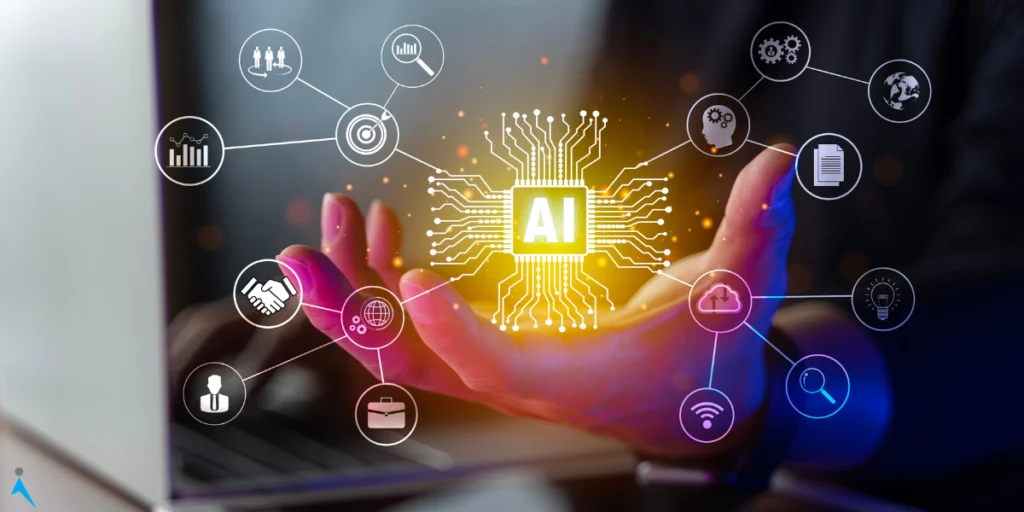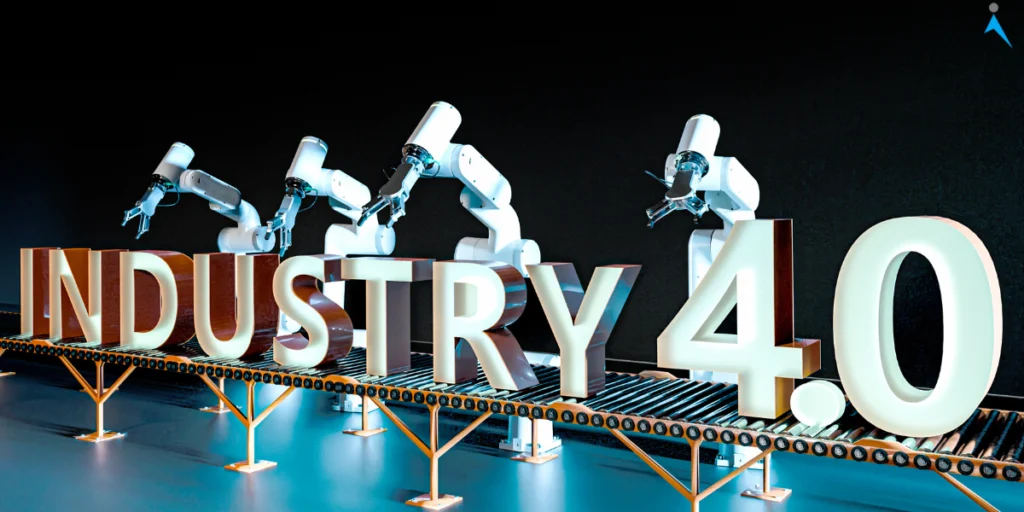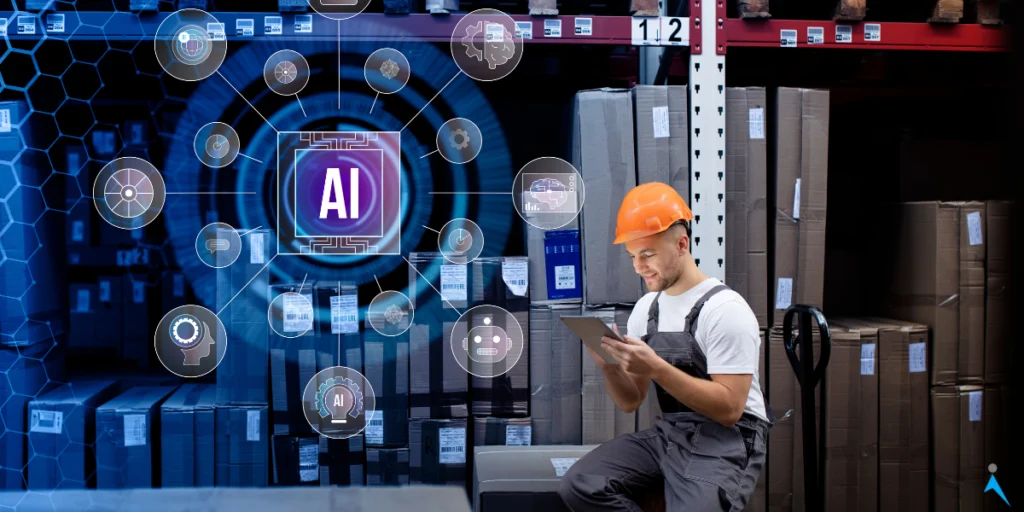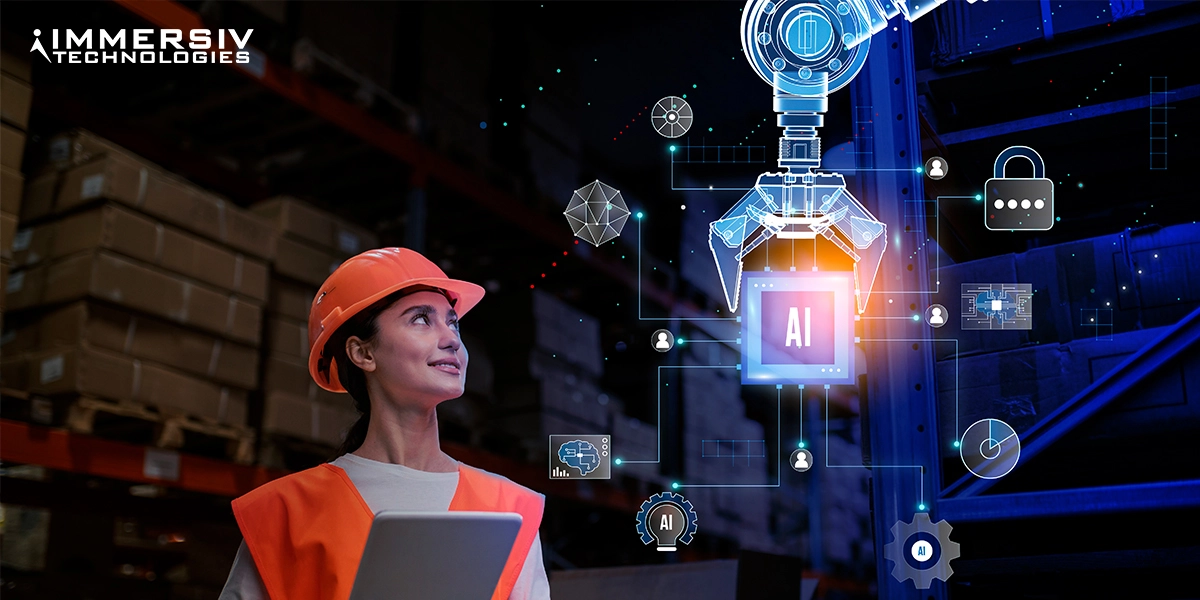Table of Contents
Artificial Intelligence (AI) is one of the most transformative technologies of the present era. It is poised to have a major impact on the world economy.
The market size is expected to show an annual growth rate (CAGR 2024–2030) of 15.83%, resulting in a market volume of US$738.80 billion by 2030. (statista.com)
It was also found that the primary motivators for Al’s adoption are optimization, growth, and innovation. With the power of AI and machine learning, we can solve some of the most pressing challenges and create new opportunities for all.
Integrating artificial intelligence (AI) has become a game-changer in the dynamic landscape of industrial operations, particularly for industrial automation processes.
Understanding AI in Simple Terms
Artificial Intelligence (AI) is like having a smart computer program that can think and learn on its own, mimicking human intelligence. At its core, AI uses data and algorithms to recognize patterns, solve problems, and make decisions without explicit programming for each task.

It’s akin to training a computer to understand and respond to information in a way that resembles human thought processes.
How AI Learns
The magic happens during the training phase. AI algorithms are trained by exposing them to vast amounts of data, allowing them to learn from examples. Just as we teach by showing examples, AI learns by recognizing patterns in data.
The algorithm adjusts its parameters iteratively until it becomes proficient at the desired task. This learning process enables AI to generalize and apply its knowledge to new situations, making it a powerful tool for a wide range of applications.
Industrial Insights through AI
In industries, historical data becomes a valuable resource for AI. By feeding past data into an algorithm, the system can be trained to recognize trends and patterns. For example, in manufacturing, historical production data can be analyzed by an AI algorithm to identify factors affecting efficiency.
This trained algorithm can then predict future outcomes or recommend optimizations, providing valuable insights for decision-making. In essence, AI turns historical data into a guide for more informed and efficient future actions. Let’s dig deeper into ‘AI in Industries’.
Role of AI in Industrial Automation
With its ability to mimic human intelligence, AI has emerged as a driving force in streamlining industrial automation processes. As decision-makers and global enterprises face new difficulties, production must be developed using the most advanced technologies.
Restructuring and redesigning control systems and other industrial assets is necessary for industries to keep up with the unheard-of rate of change.
AI can assist in achieving these objectives. Applications of AI are already widely used in various sectors, including banking, gaming, retail, entertainment, and more.
New methods of automating industrial tasks with smarter sensors, controllers, IO modules, gateways, enterprise systems, etc., are driving the fourth industrial revolution (4IR). The synergy between AI and automation process engineering services is evident, facilitating precision and speed in executing tasks.

Among the various dimensions, incorporating design automation processes has gained prominence, where AI is reshaping how designs are conceptualized and brought to fruition.
The Rise of AI in Industrial Settings
Artificial intelligence (AI) technologies are becoming more widely used in the industrial sector to boost operational capabilities, open up new opportunities, and make businesses more flexible to changing market conditions.
The rise of AI in industrial settings can be attributed to its capabilities in data analysis, machine learning, and predictive modeling.
In particular, 3D automation services are witnessing a surge in demand, allowing industries to automate intricate designs with great accuracy. As industries evolve, the demand for a 3D design automation company becomes increasingly pivotal, ensuring businesses stay at the forefront of technological advancements.
AI in Manufacturing
AI is significantly changing the manufacturing sector. There are numerous ways it is improving industrial automation processes in manufacturing.
| AI Application in Manufacturing | AI Application in Manufacturing |
| AI in Logistics | Optimizes stock levels to prevent overstocking or understocking, leading to increased sales and profits. |
| AI in Supply Chain Management | Enhances supply chain management with real-time capacity forecasting and disruption alerts, improving overall efficiency. |
| AI for Factory Automation | Streamlines factory operations, automates troubleshooting, and ensures a financial return on investment in automated systems. |
| AI for IT Operations (AIOps) | Utilizes big data and machine learning to automate IT operations, including data management, service management, and anomaly identification. |
| Design and Production With AI | Generative Design Software produces multiple product design iterations based on inputs, improving efficiency and innovation. |
| IoT and AI | AI combined with IoT devices in manufacturing (IIoT) enhances precision and output through real-time operating data. |
| AI in Warehouse Management | Automates warehouse processes, lowers costs, increases productivity, and improves logistics and quality control. |
| AI Process Automation | AI-powered software optimizes procedures, maintains high production rates, and identifies and eliminates inefficiencies. |
| AI for Predictive Maintenance | Analyzes sensor data to predict machinery breakdowns, enabling preventive maintenance and boosting productivity. |
| AI-Based Product Development | AI, using AR and VR, allows testing of product models, simplifying maintenance and bug fixing for faster innovation. |
| AI-Based Connected Factory | Smart factories with sensors and cloud integration enable real-time shop floor vision, resource monitoring, and timely intervention. |
| Quality Assurance Using AI | AI-driven flaw identification with computer vision improves product quality, reduces recalls, and enhances factory worker safety. |
| AI for Purchasing Price Variance | AI aids in estimating raw material costs, vendor selection, and centralized procurement data management. |
| AI Order Management | AI streamlines order management, generates purchase requests, and handles various order types from multiple sales channels. |
| AI for Cybersecurity | AI-driven cybersecurity systems and risk detection algorithms safeguard industrial facilities, preventing losses due to cyberattacks. |
Key AI Technologies Revolutionizing Industrial Automation Processes
CAD automation services are pivotal in the paradigm shift towards AI-driven Industrial Automation Processes. AI algorithms seamlessly integrate with CAD systems, automating complex design tasks and reducing the margin for error.
It enhances overall efficiency, enabling design teams to focus on creative aspects while leaving repetitive tasks to AI-powered systems.
Real-world Applications of AI in Automation Processes
- The healthcare sector utilizes AI for diagnostic imaging, enhancing accuracy in medical diagnoses.
- Logistics and supply chain management benefit from AI-driven automation, optimizing routes, and predicting demand patterns.

- 3D automation services are pivotal in designing intricate components and ensuring safety and aesthetics in the automotive industry. AI-driven systems streamline production lines.
- For Product Design and Development, AI can generate multiple design iterations based on user-defined constraints. AI streamlines the prototyping process, reducing time and cost.
- Integrating automation process engineering services into the energy sector streamlines the monitoring and maintenance of power plants.
- AI enhances architectural rendering for photorealistic visuals. It can create immersive VR experiences for architectural walkthroughs.
- In the furniture industry, AI assists in designing customized furniture based on user preferences. Also, it can aid in inventory management and order fulfillment.
The Power of AI in Workflow
Artificial intelligence (AI) technologies are forecast to add US$15 trillion to the global economy by 2032. Integrating AI in industrial automation processes is a transformative journey towards efficiency, precision, and innovation.
As industries embrace these technological advancements, the demand for reliable partners becomes crucial.
Stay ahead in the competitive landscape by partnering with Immersiv Technologies for cutting-edge solutions that redefine the future of industrial automation.


